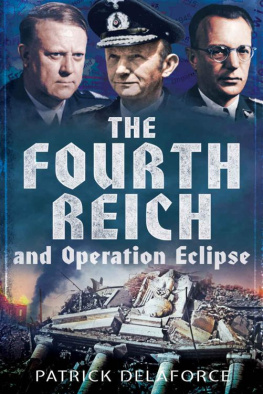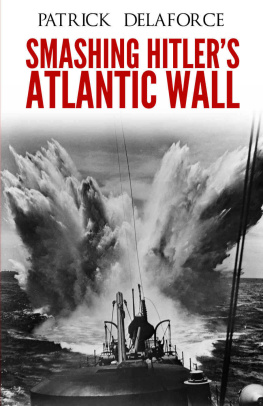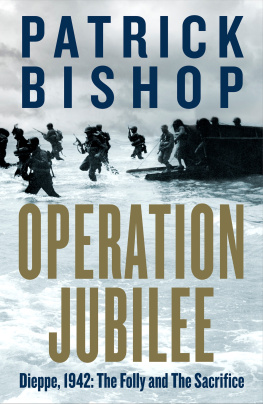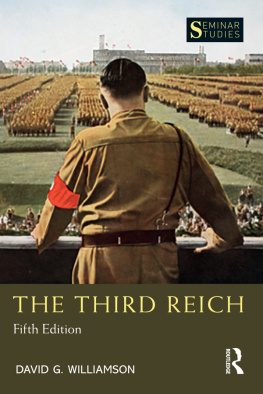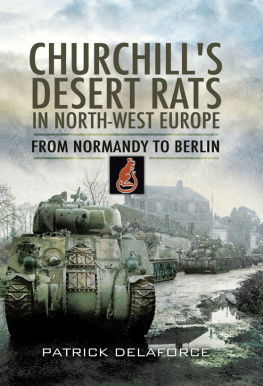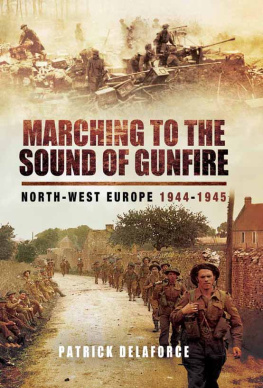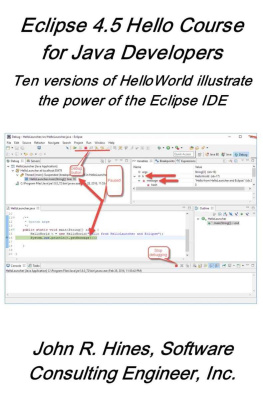Patrick Delaforce - The Fourth Reich and Operation Eclipse
Here you can read online Patrick Delaforce - The Fourth Reich and Operation Eclipse full text of the book (entire story) in english for free. Download pdf and epub, get meaning, cover and reviews about this ebook. year: 2015, publisher: Fonthill Media, genre: Non-fiction. Description of the work, (preface) as well as reviews are available. Best literature library LitArk.com created for fans of good reading and offers a wide selection of genres:
Romance novel
Science fiction
Adventure
Detective
Science
History
Home and family
Prose
Art
Politics
Computer
Non-fiction
Religion
Business
Children
Humor
Choose a favorite category and find really read worthwhile books. Enjoy immersion in the world of imagination, feel the emotions of the characters or learn something new for yourself, make an fascinating discovery.
- Book:The Fourth Reich and Operation Eclipse
- Author:
- Publisher:Fonthill Media
- Genre:
- Year:2015
- Rating:3 / 5
- Favourites:Add to favourites
- Your mark:
- 60
- 1
- 2
- 3
- 4
- 5
The Fourth Reich and Operation Eclipse: summary, description and annotation
We offer to read an annotation, description, summary or preface (depends on what the author of the book "The Fourth Reich and Operation Eclipse" wrote himself). If you haven't found the necessary information about the book — write in the comments, we will try to find it.
The Fourth Reich and Operation Eclipse — read online for free the complete book (whole text) full work
Below is the text of the book, divided by pages. System saving the place of the last page read, allows you to conveniently read the book "The Fourth Reich and Operation Eclipse" online for free, without having to search again every time where you left off. Put a bookmark, and you can go to the page where you finished reading at any time.
Font size:
Interval:
Bookmark:
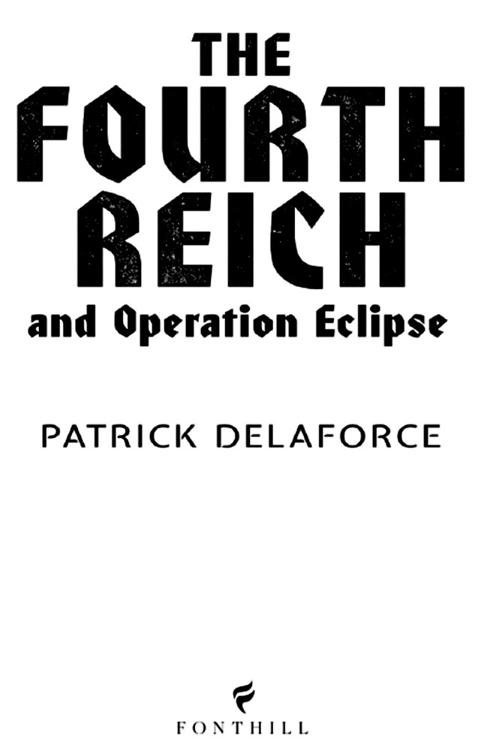
Fonthill Media Language Policy
Fonthill Media publishes in the international English language market. One language edition is published worldwide. As there are minor differences in spelling and presentation, especially with regard to American English and British English, a policy is necessary to define which form of English to use. The Fonthill Policy is to use the form of English native to the author. Patrick Delaforce was born and educated in England and now lives at Brighton therefore British English has been adopted in this publication.
Fonthill Media Limited
Fonthill Media LLC
www.fonthillmedia.com
First published in the United Kingdom and the
United States of America 2015
British Library Cataloguing in Publication Data:
A catalogue record for this book is available from the British Library
Copyright Patrick Delaforce 2015
ISBN 978-1-78155-400-5
The right of Patrick Delaforce to be identified as the author of this work has been asserted by him in accordance with the Copyright, Designs and Patents Act 1988.
All rights reserved. No part of this publication may be reproduced, stored in a retrieval system or transmitted in any form or by any means, electronic, mechanical, photocopying, recording or otherwise, without prior permission in writing from Fonthill Media Limited
Typeset in Sabon 10.5/14
Printed in the USA
Contents
Foreword
The Fourth Reich and Operation Eclipse is the last book of a trilogy. Montys Rhine Adventure and Invasion of Hitlers Third Reich were the first two, published by Fonthill Media.
In the first book Patrick Delaforce fought and was wounded in Holland, and in the second book he was wounded on the banks of the River Elbe. In this book the division in which he fought, 11th (Black Bull) Armoured Division corralled the Fourth Reich in Flensburg and then, when four key parts of Operation Eclipse had gone to plan, their Hussar Comet tanks and the armoured infantry of 1st Herefords and 1st Cheshires completed the capture of the Fourth Reich along with many of Hitlers lite.
It was absolutely vital in May 1945 that the appalling Reichministers of Norway, with 400,000 undefeated troops, Denmark, with over 200,000 undefeated troops, the malevolent German governors of the Netherlands, with 130,000 troops including Dutch SS, plus the great city of Hamburg should surrender to the British and not prolong the war by another three or four months with consequent heavy casualties. Adolf Hitlers Berlin bunker edict, Operation Nero, meant turning all the surviving pieces of his dying Third Reich into a wastelandabsolute Armageddon.
Delaforce also spent three weeks in Flensburg and, aged 21, was a judge/jurist for the regional War Crimes Tribunals of Hamburg in 1945 and Oldenburg in 1946 and witnessed Mr Alfred Pierrepoint hanging 13 war criminals in Hameln in December 1945.
CHAPTER 1
Planning the End of the Third Reich
It is doubtful whether the great commanders of the past, Julius Caesar, Marlborough, Wellington, Napoleon, and certainly not Adolf Hitler, thought through and planned thoroughly in great detail how the resulting peace might be won after their many shattering victories.
War claims the lions share of a governments attention and resources. Its demands are immediate, involving life and death, victory and defeat. Peace may be only a dimly perceived destination, lacking immediacy, low on the list of priorities. Nonetheless, inadequate preparation for the peace may jeopardise the victory gained by arms.So wrote Basil Liddell Hart, the famous war historian of a bygone era.
Carl von Clausewitz, the great Prussian thinker, wrote:
The political object is the goal, war is the means of reaching it and means can never be considered in isolation from their purpose.And later Liddell Hart expanded his theme:
The object of war is to attain a better peace. Hence it is essential to conduct war with constant regard to the peace you desire. If you concentrate exclusively on victory with no thought for the after-effect, you may be too exhausted to profit by the peace [at the end of the Second World War, the UK was exhausted and bankrupt] while it is almost certain that the peace will be a bad one, containing the germs of another war [exactly as happened immediately after the end of the Great War]. Statesmen bear responsibility never to lose sight of the post-war prospect in chasing the image of victory.The Battle for Britain, mainly fought in the air, helped defeat Hitlers Operation Sealion. Goerings Luftwaffe had failed to destroy the RAF and bombed all the main citiesthe Baedecker raidsinstead. Hitlers army and navy showed no enthusiasm, so Barbarossa was unleashed and Britain breathed again.
Winston Churchill wrote in October 1941:
We were still hard-pressed and our only ally Russia seemed near to defeat. Nevertheless I had resolved to prepare for an invasion of the Continent when the tide should turn. First we had to increase the intensity and scope of our raids and then translate all this experience into something much more massive. To mount a successful invasion from the United Kingdom new engines of war must be contrived and developed, the three fighting services must be trained to plan and fight as one team, supported by the industry of the nation and the whole island converted into an armed camp for launching the greatest seaborne assault of all time.This assault came to pass three years later[Operations Neptune and Overlord].
Hitler had declared to the German people 15 weeks into Barbarossa, on 3 October 1940, The final drive for Moscow is the beginning of the last great decisive battle of the war. So certain was he of victory that he had ordered the Army High Command to disband 40 infantry divisions and return their ranks to industry!
In May 1942 Churchill set up the Combined Commanders to plan for new offensive tactics with Earl Mountbatten in charge, promoted to Vice-Admiral. Combined raids on Norway, Bruneval, St Nazaire and the costly defeat at Dieppe in August 1942 followed. But major Anglo-American amphibious assaults were more successful in the North African and Mediterranean offensives.
In January 1943 Lieutenant-General Frederick Morgan, Chief of Staff, Supreme Commander (COSSAC), was initially responsible for three tasks:
a) Plan deception operations designed to reduce pressure on the Soviets by pinning the maximum number of German divisions in the West. For most of the war Hitler was convinced that Britain would launch attacks, even invade Norway, and accordingly kept there almost half a million troops (submarine bases, aircraft bases and a dozen harbour/port garrisons). From the initial COSSAC plans emerged Operation Solitude and Operation Fortress.
b) Plan the invasion of Europe, the basis for Neptune and Overlord.
c) Plans for an immediate return to the continent in case German resistance unexpectedly ended. Operation Rutter, then Jubilee in August 1942 followed the brilliant and audacious April raid on St Nazaire. These brave efforts worried the German defenders in France and perhaps proved to Stalin that the Allies were trying to help.
At that stage Morgan judged the sum total of all the various factors now operating cannot be far off from that of the factors which caused the [Great War] collapse in 1918. But he received no guidance. His committees operated in a vacuum. No civil affairs structure existed in the USA or UKthe post-war world was largely unexplored territory.
A draft of Operation Rankin appeared for the Quebec Conference of August 1943 and was submitted to Churchill and Roosevelt. It was a plan to occupy, as rapidly as possible, appropriate areas from which we can take steps to enforce the terms of unconditional surrender imposed by the Allied Government on Germany and in addition to carry out the rehabilitation of the liberated countries. Rankin tried to estimate the number of divisions necessary to carry out the occupation of identified strategic areas. The specified spheres of responsibilityBritish in the Netherlands (1), Denmark (2), the Ruhr (6), the Rhine valley (11), NW Germany (5)totalled 25. The Americans would be responsible in Belgium, France, Luxembourg, and the Rhine valley, south of Dusseldorf (the ports of Bremen or Hamburg would be utilised by the US and UK respectively, plus Antwerp). The primary tasks would be disarmament of German troops, establishment of military government in the occupied areas in order to preserve law and order and to ensure that the Force Commanders instructions in regard to security disarmament were all carried out. It was urgent for a Civil Affairs staff to be appointed to carry out the plans. Rankin was divided into three cases: A). A rapid German collapse and then early execution of Overlord. B). Contraction of German forces into pre-war borders. C). Unconditional surrender. The planners thought Rankin C was the most likely. Thus the seizure of all airbases in France was vital to support future operations. Next, the occupation of the Siegfried Line. Finally, Allied forces would occupy designated areas of Germany including Berlin in order to establish control at the earliest possible moment over the industrial, political and communication centre of Germany. Only British and American zones of occupation were specified, side-lining the issue of Stalins intentions and success on the Eastern Front.
Next pageFont size:
Interval:
Bookmark:
Similar books «The Fourth Reich and Operation Eclipse»
Look at similar books to The Fourth Reich and Operation Eclipse. We have selected literature similar in name and meaning in the hope of providing readers with more options to find new, interesting, not yet read works.
Discussion, reviews of the book The Fourth Reich and Operation Eclipse and just readers' own opinions. Leave your comments, write what you think about the work, its meaning or the main characters. Specify what exactly you liked and what you didn't like, and why you think so.

